- Coming soon: Oceanic Word UnitsMy proposal for a project on Oceanic Word Units was recently approved by the German Research Society! We’ll start in 2024, but I’m already excited and looking forward to diving into vowel harmony, clitics, and the morphosyntax of subject markers. You can read the proposal here.
- Afaka font
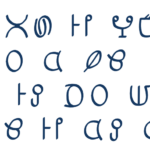 I regularly go a little overboard when designing puzzles for the German Olympiad of Linguistics, but for one of this year’s puzzles, I really outnerded myself. I designed a True Type Font for the writing system Afaka, which was developed for the creole language Ndyuka. It was conceived in 1910 by Afáka Atumisi and is … Continue reading “Afaka font”
I regularly go a little overboard when designing puzzles for the German Olympiad of Linguistics, but for one of this year’s puzzles, I really outnerded myself. I designed a True Type Font for the writing system Afaka, which was developed for the creole language Ndyuka. It was conceived in 1910 by Afáka Atumisi and is … Continue reading “Afaka font” - Custom typological maps with R
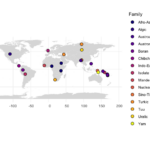 I used to plot my typological language data to geo-spatial maps with Generic Mapping Tools, which is awesome, and where a simple two-liner will do the job. But I found this hard to use in teaching, since it doesn’t run smoothly on everyone’s operating system. So it’s time for me to move on and learn … Continue reading “Custom typological maps with R”
I used to plot my typological language data to geo-spatial maps with Generic Mapping Tools, which is awesome, and where a simple two-liner will do the job. But I found this hard to use in teaching, since it doesn’t run smoothly on everyone’s operating system. So it’s time for me to move on and learn … Continue reading “Custom typological maps with R” - Wrapping up 2022: more talks and publications
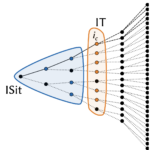 I haven’t been posting regularly about recent talks and publications, so here are a few more highlights from the second part of 2022:
I haven’t been posting regularly about recent talks and publications, so here are a few more highlights from the second part of 2022: - German Olympiad of LinguisticsI am heavily involved in organizing the German Olympiad of Linguistics each year (Deutsche Linguistik-Olympiade, DOL). I am primarily responsible for designing, curating and testing puzzles for the three rounds of competitions we host. In order to gain more support, we got together to found a “Verein”, the kind of institution that makes Germany go … Continue reading “German Olympiad of Linguistics”
- A Grammar of Daakaka onlineMy grammar of Daakaka, which was first published in print in 2015, is now available online from De Gruyter’s website. Please check if you can access it via your institution, or get in touch with me for a digital copy.
- Freiburg 2022The semester ended for me with a highly enjoyable visit at Uta Reinöhl’s lab in sunny Freiburg. I took the opportunity to talk about a puzzle concerning the role and emergence of word units in Oceanic. I’m currently writing a research proposal in the context of a Collaborative Research Centre we’re cooking up at HHU, … Continue reading “Freiburg 2022”
- Irrealis is realMy paper with Ana Krajinović and Manfred Krifka on the role of irrealis in TAM systems is now online and free of charge. We use the tripartite model of branching time I developed in this other paper to account for the meanings of realis and irrealis markers in a variety of languages and delineate their … Continue reading “Irrealis is real”
- The German Olympiad of Linguistics (DOL)Last weekend, we had the last round of the German Olympiad of Linguistics (it’s really the selection of the German teams to the International Olympiad of Linguistics, but that’s even more verbose). Designing that last set of puzzles in time hasn’t been easy, but I had awesome support from my colleagues Ruben Van de Vijver … Continue reading “The German Olympiad of Linguistics (DOL)”
- More resources on ChineseFor my class on the structure of Chinese, I wanted to give my students some accessible resources so they can make their own observations. To that end, I translated and glossed some texts. Among them are the lyrics to one song, as described here earlier. In addition, I processed two literary texts this way (with … Continue reading “More resources on Chinese”
- Syntactic RecursionIn the MA program, I taught a class on syntactic recursion during the winter term 2020/21. This is a topic that I have studied quite extensively before, and it features prominently in several past and ongoing grant proposals. I also think it’s an important and interesting topic that touches several fundamental debates in linguistics. I’m … Continue reading “Syntactic Recursion”
- Daakaka grammar classOne of the wonderful features of the linguistics curriculum at HHU are the obligatory classes on structures of non-Indoeuropean languages. They take 4 hours per week, instead of the regular 2, and I’m looking forward to teaching them on a regular basis. For the winter term of 2020/21, I taught a class on Daakaka. I’m … Continue reading “Daakaka grammar class”
- Exploring linguistic typology through language puzzlesIn this class, we solve a linguistic puzzle each week, primarily from the International Olympiad of Linguistics. Topics include writing systems, number systems, verbal morphology, kinship systems, and others. I first taught this class in the winter of 2020/21. You can use my syllabus for inspiration, if you’d like to try this out. My students … Continue reading “Exploring linguistic typology through language puzzles”
- Lyrics for Chinese classUpdate: I did get great feedback on the lyrics by Charles Yang, who commented on exactly those places I was uneasy about. I updated the translation and am now finally getting around to uploading my homepage. You’ll find the revised translation under the link below. For more glossed texts, also see this post. I’ll be … Continue reading “Lyrics for Chinese class”
- AFLA 2020I’m very excited about this year’s AFLA 2020. The organizers are doing a fantastic job at hosting it online. You can see the program and download all the slides here. There is also a youtube channel where all the talks have been posted. I haven’t been able to see all talks live so far, due … Continue reading “AFLA 2020”
- The German Olympic LinguistsI should have gotten around to this earlier, but here goes: Together with my colleagues at ZAS, Nathalie Topaj and André Meinunger, I organized the selection of the German team for the International Olympiad of Linguistics again this year, even though there it won’t take place this year.There is a short report on the ZAS … Continue reading “The German Olympic Linguists”
- Multiverb constructions at the syntax-semantics interface
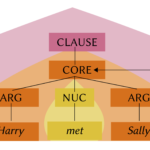 The last talk of 2019 was an invited talk in Düsseldorf, where I presented some of my recent work on adverbial serial verb constructions in Daakaka and beyond. You can download my slides here.
The last talk of 2019 was an invited talk in Düsseldorf, where I presented some of my recent work on adverbial serial verb constructions in Daakaka and beyond. You can download my slides here. - Out now: Expressing possibility in two Oceanic languagesWe can often choose between more basic, highly grammaticalized, ways to express a given meaning, and more verbose ways of doing so. Thus, in English, we may say “Brenda can catch the train” or “it is possible that Brenda will catch the train”, with quite similar interpretations. In my article with Anna Margetts, we argue … Continue reading “Out now: Expressing possibility in two Oceanic languages”
- Paradigms and rules
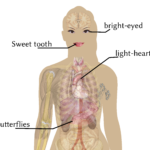 I was invited to the University of Potsdam to talk about some of my recent work on morphology. I took the opportunity to discuss some of my observations about word-like properties of complex phrases, in particular the way they combine into word-like paradigms. You can see my slides here.
I was invited to the University of Potsdam to talk about some of my recent work on morphology. I took the opportunity to discuss some of my observations about word-like properties of complex phrases, in particular the way they combine into word-like paradigms. You can see my slides here. - How many books fit into a suitcase?Turns out, not that many. I’m moving offices from HU to ZAS right now, and it will take a few more trips through Berlin Mitte before the handsome shelves of my new office are filled. I’ll post more about my new position and rewrite my landing page as soon as I’ve figured out who I … Continue reading “How many books fit into a suitcase?”
- Reciprocal strategies in a language without reciprocal markersThere was a very enlightening small workshop on reciprocals in Utrecht just now. I was invited to talk about reciprocals in Daakaka, which was an interesting assignment since Daakaka does not have reciprocal pronouns or verbal reciprocal morphology. Speakers do not have to distinguish between reciprocal, reflexive and regular transitive structures. There are however things … Continue reading “Reciprocal strategies in a language without reciprocal markers”
- Out now: Public access to research data in language documentationThere was an expert-only workshop in Cologne in 2016 on Open Access and Open Data, which had the goal to produce a white paper with recommendations on best practices for publishing Data from language documentation. This paper has now been published in Language Documentation and Conservation and is freely available here.
- Linguistics and ideologies in თბილისიThere was a wonderful small conference on Ideologies and Linguistic Ideas in beautiful Tbilisi last week, and I’m very happy I had the opportunity to team up with my colleague Marcin Kilarski to present some of our work on bias and ideologies in old and new debates on linguistic complexity. I also learned a lot … Continue reading “Linguistics and ideologies in თბილისი”
- Realis and Irrealis at ALT, PaviaI heard many fantastic talks at this year’s ALT in Pavia and had some very inspiring conversations. The talk I gave was about realis and irrealis in Oceanic and beyond, and you can download the slides here.
- SLE in Leipzig: TAM across languagesTogether with my two fantastic co-organizers Ana Krajinović and Jozina Vander Klok, I just hosted a workshop on tense, aspect and modality across languages at this year’s SLE in Leipzig. We had awesome presentations and inspiring discussions, learned a lot and had great fun.
- Out now: Mapping irrealityOur paper on how to map the modal-temporal semantics of TAM markers in Oceanic languages empirically is now out in the proceedings of Linguistic Evidence 20.
- APLL in LeidenMy colleagues Ana Krajinović and Manfred Krifka are currently at APLL in Leiden to present our joint work on timitive structures in Oceanic, which have the shape it’s not good/it’s bad if… . Timitive modality is a category often found in Oceanic, which typically occurs in warnings (Watch out, you might fall!) or negative purpose … Continue reading “APLL in Leiden”
- Out now: Counterfactuality and PastMy article on counterfactuality and past is out now, and it’s free to access. In 2011, while I was working on the Daakaka grammar, I looked at the system of TAM markers and asked myself how hard it would be to figure out their meanings. Manfred Krifka suggested I start working with branching time to … Continue reading “Out now: Counterfactuality and Past”
- MelaTAMP at LTC 19 in PoznańOur project was represented with two papers in this year’s Language and Technology Conference in Poznań. Ana Krajinović presented joined work with colleagues from Vanuatu and Melbourne on community-led language documentation. She won the award for the best student presentation. Annika Tjuka, in a joined paper with Lena Weißmann and me, presented our tag set … Continue reading “MelaTAMP at LTC 19 in Poznań”
- Diversity linguistics in CologneI’m currently in Cologne at the small Vielfaltslinguistik Conference (Diversity linguistics). It’s great to see so much new and interesting work on lesser described languages. My own talk, on joined work with Manfred Krifka and Ana Krajinović, focuses on empirical methods in our MelaTAMP project. Our slides can be downloaded here: [download id=”473″].
- Habituality in four Oceanic languagesOur article (with Ana Krajinović, Anna Margetts, Nick Thieberger and Valérie Guérin) is out now and currently available for free here. In this article, we talk about habitual aspect in four Oceanic languages and demonstrate how it is (or isn’t) typically expressed. Reduplication and imperfective aspect play a particularly prominent role, sometimes in combination with … Continue reading “Habituality in four Oceanic languages”
- International Linguistics OlympiadGermany will participate in this year’s Olympiad of Linguistics in Yongin, Korea, and I am part of the small team of people who are organising the selection and training of the German team. We’ll have two rounds of online tests before inviting the finalists to our Berlin boot camp.
- How to revise your article after reviewingOpening the mail… Once you have submitted your article to a research journal, it can take a few weeks to a few months before you hear back. During that time, your editors are busy finding competent and willing reviewers, and hopefully, those reviewers are busy reading your work with discretion and charity and thinking about … Continue reading “How to revise your article after reviewing”
- Getting your manuscript ready for its first submissionYou have interesting and original research to publish, but you have not done this before, how do you proceed? Here is how I do it.
- Out now: Proceedings of Sinn und Bedeutung 21The proceedings for Sinn und Bedeutung 21 is out now and available from here. Check out my article on how to derive the discontinuity implicature of past markers in Daakaka and elsewhere!
- GMT: Changing the color of a symbol within a xy fileThis is a very specific problem with Generic Mapping Tools which I didn’t find well documented: if you map certain symbols to a list of coordinates specified in COORDINATES.xy, you can specify that subsets of those coordinates are mapped to symbols in different colors in two ways:
- Counterfactuality and Past in KonstanzFor my second talk in Konstanz, I discussed my paper on Counterfactuality and Past in the What-if group. You can download the current manuscript version here: [download id=”362″]. My slides can be found here: [download id=”367″].
- Mapping irreality in KonstanzLast week, I had the privilege of giving two talks in Konstanz. In the colloquium of the linguistics department, I talked about our latest research on counterfactual futures in Oceanic and what they tell us about tense and mood in our subject languages. Download the slides here: [download id=”348″]. Read the paper here: [download id=”358″].
- Storyboard books in Daakaka[download id=”327″] Here is the pdf that I used to produce the storyboard picture books now available at amazon. I have used storyboards both from the Totem Field Storyboards site and storyboards I have produced as part of the MelaTAMP research project. The Daakaka text is a selection of the results from last year’s fieldwork … Continue reading “Storyboard books in Daakaka”
- Mapping Irreality in GöttingenI went to Göttingen last week to talk about modality, which is turning into a pleasant tradition. In my talk, I outlined the typological debate on the irrealis distinction, introduced the tripartite branching-time model that I think will help us the relevant cross-linguistic variation, and discussed how the same approach also sheds new light on … Continue reading “Mapping Irreality in Göttingen”
- Complexity at the POS levelThere was an interesting small workshop in Torun in April on Measuring Linguistic Complexity. When the call came out, I had just finished a preliminary overview on the previous literature on the topic and was ready to get cracking, so I got together with Vera Demberg to test our hypothesis that focussing on POS tags rather … Continue reading “Complexity at the POS level”
- Grammaticalisation and information densityMy work in the Collaborative Research Unit on information density (ID) in Saarbrücken has made me think about the relation between grammaticalisation and ID. In an invited talk to Saarbrücken in April, I explored some of my ideas on this topic. You can find the slides here.
- Poster at Linguistic Evidence in TübingenThe Linguistic Evidence conference in Tübingen this year is long over and I’m sad I couldn’t be there, but our poster was well represented by my two co-authors, Manfred Krifka and Ana Krajinović. Click here to download the PDF.
- Perspectives on Low-Resource Languages and Language VarietiesMy colleague Stefania Degaetano-Ortlieb and I, with generous support from Elke Teich, organised a workshop last week. We invited researchers from a variety of backgrounds, spanning language documentation, typology, language acquisition, computational linguistics and historical linguistics. We were very happy with the inspiring talks and vibrant discussions about challenges and solutions, which I am sure will … Continue reading “Perspectives on Low-Resource Languages and Language Varieties”
- Last talk of 2017, at the MPI for the Science of Human History2017 was a year full of talks, so don’t be surprised if you won’t see me on the circuit as much during 2018. The last talk of that year was at the MPI in Jena, where I talked about some of the things you’ll see if you compare languages based on corpus data that you’re … Continue reading “Last talk of 2017, at the MPI for the Science of Human History”
- Multi-verb constructions — is there a continuum?I’m excited about the upcoming workshop on Multi-verb constructions at ZAS Berlin. I’m going to use the opportunity to present some of my latest thoughts on the topic and lobby for systematic typological comparison. See my slides here.
- The syntax-morphology trade-offYesterday, I gave a talk at the Language Science Colloquium at Universität des Saarlandes, about recent research on the syntax-morphology trade-off and further perspectives for text-based typology. Download the slides here.
- Bibtex bibliographies selected by keywords, with customised keyword separatorsThis is a very specialised problem, but since I just found the solution, I wanted to briefly document this for myself. I usually use natbib, but for the preparation of reading lists, sorted by topic, I wanted to try biblatex. Creating a list of references selected by a keyword is not a problem at all.
- Starting in Saarbrücken: Information density, complexity and cross-linguistic variationIt’s October already and I have just received my appointment as a guest professor in the SFB (special research unit) on Information density in Saarbrücken. I will teach a class on “Cross-linguistic variation in structural complexity” and I’m excited to learn more about information density and possible applications of existing hypotheses and tools to typological … Continue reading “Starting in Saarbrücken: Information density, complexity and cross-linguistic variation”
- Upcoming workshop: Data management and corpus creationI’m looking forward to this week’s CLARIN-D workshop on data management and corpus creation in Hamburg. As a member of F-AG 3, I’ll be attending with a short talk and am curious to learn more about current practices and experiences.
- Now out: Dozing eyes and drunken facesIn many languages of the world, emotions and medical conditions are not attributed to an individual, but to a certain body part. For example, instead of saying “I am sad”, you may have to say something along the lines of “my heart is heavy” in many languages. In these cases, the meaning of “being sad” … Continue reading “Now out: Dozing eyes and drunken faces”
- Prepare your LaTeX document for publicationWhen your manuscript has been accepted for publication, and you have adjusted the layout to the publisher’s requirements, these are the final steps before submission:
- Compiling a list of glosses from your glossed examples in a LaTeX document (under UNIX)If you have many interlinearized examples in your LaTeX documents, you have probably wondered about the best way to handle them. Here are some ideas. There are two potential problems with the glosses: 1) different publishers may have different requirements for how to print them, so transferring glossed examples from one manuscript to another may … Continue reading “Compiling a list of glosses from your glossed examples in a LaTeX document (under UNIX)”
- Three deaths and one marriage……made for a challenging field trip to Ambrym this year. Still, I was lucky enough to get enough speakers both of Daakaka and Dalkalaen to collect the data we need for MelaTAMP – thanks to the people of Emyotungan and Tio Bang in Port Vila. Now I’m excited to start with the analysis. Stay tuned.
- MelaTAMP Workshop in Port VilaWe held a small workshop at the University of the South Pacific yesterday, on Emalus Campus in Port Vila, Vanuatu. The purpose was to introduce and discuss the storyboards we have developed as part of the MelaTAMP project. We thank Robert Early and Meriani Situ for their organisation and local support, and we’re happy that our … Continue reading “MelaTAMP Workshop in Port Vila”
- APLL in ParisI have just returned from APLL 9 in Paris that came with lots of fascinating research and productive discussions. To check out my talk with Anna Margetts on multi-clausal expressions of possibility in Saliba-Logea and Daakaka, click on the thumbnail on the left.
- Tagging tense and modality in OceanicI just came back from an inspiring and informative trip to Saarbrücken. I gave a talk in the FEAST series about tagging tense, aspect, modality and polarity in Oceanic languages. Here are my slides for the talk.
- Storyboards for TAM expressionsFor our project, we primarily work with corpus data, but we also have funding to do further field work and elicit contexts that are rare or unattested in the corpora. As our primary method of elicitation, we have decided to use storyboards, which are short scripts accompanied by pictures. I have created the pictures for … Continue reading “Storyboards for TAM expressions”
- Pretty WALS mapsThe World Atlas of Language Structures maps data from typological studies to a world map. In addition to the online version, there is also a program for the local production of maps. However, the options for customisation are limited. I use the free and open command-line tool GMT for the production of linguistic maps. It has awesome … Continue reading “Pretty WALS maps”
- The future is what the universe wantsThere was a remarkable small workshop on imperatives at ZAS last week that I was happy to be part of. It was a welcome opportunity to take up my work on potential mood directives in Daakaka and their relations to future assertions and embedded clauses. You can see my slides here.
- Towards an ontology of modal flavoursI’m still feeling warm and fuzzy from the wonderful workshop we had last week at the DGfS conference about modal flavours. The idea for this workshop had formed last year during the SIAS summer institute on the investigation of linguistic meaning, together with Ryan Bochnak and Anne Mucha. We were very happy to win Aynat Rubinstein … Continue reading “Towards an ontology of modal flavours”
- Out now: Indefinites in Daakaka (Vanuatu)There are two indefinite articles in the Oceanic language Daakaka, TUSWA and SWA. Like weak NPIs or unspecific indefinites in many other languages, TUSWA is excluded from positive assertions about the episodic past or present. In this paper, I try to locate them within the cross-linguistic space of indefinites and NPIs and sketch out an … Continue reading “Out now: Indefinites in Daakaka (Vanuatu)”
- Upcoming talk at CologneI’m excited to visit Cologne again, this time for a talk on an Oceanic perspective on tense and modality. If you’re in the area, you’ll find the details here.
- Alienability as control — now out in printI was fortunate to be invited as a contributor to a special edition of Lingua (in pre-Glossa times) on possession. My article on “Alienability as control” is now out in print at long last and, alas, behind a paywall. You can contact me to get the manuscript.
- Towards an ontology of modal flavorsI’m very excited about our upcoming workshop at the DGfS 2017 titled “Towards an ontology of modal flavors”. Watch this link for a description and updates on the schedule: AG 9 – Towards an ontology of modal flavors
- Franz Boas AwardCongratulations go to my esteemed colleague Sonja Riesberg who received the first Franz Boas Award for her work in the collection and archiving of data for the CELD corpus! The award is meant to promote collections of archived materials as academic publications and generate awareness and recognition for this type of scholarly output. Sonja Riesberg … Continue reading “Franz Boas Award”
- Poster for Sinn und Bedeutung 2016I’m excited about the upcoming Sinn und Bedeutung conference in Edinburgh. The program looks very promising and I’ll have an opportunity to discuss some of my latest thoughts on the Daakaka distal and modal semantics more generally. If you can’t come but would like to see my poster, here it is. SuB2016DaakakaDistal_poster It was created … Continue reading “Poster for Sinn und Bedeutung 2016”
Skip to content
Linguist
